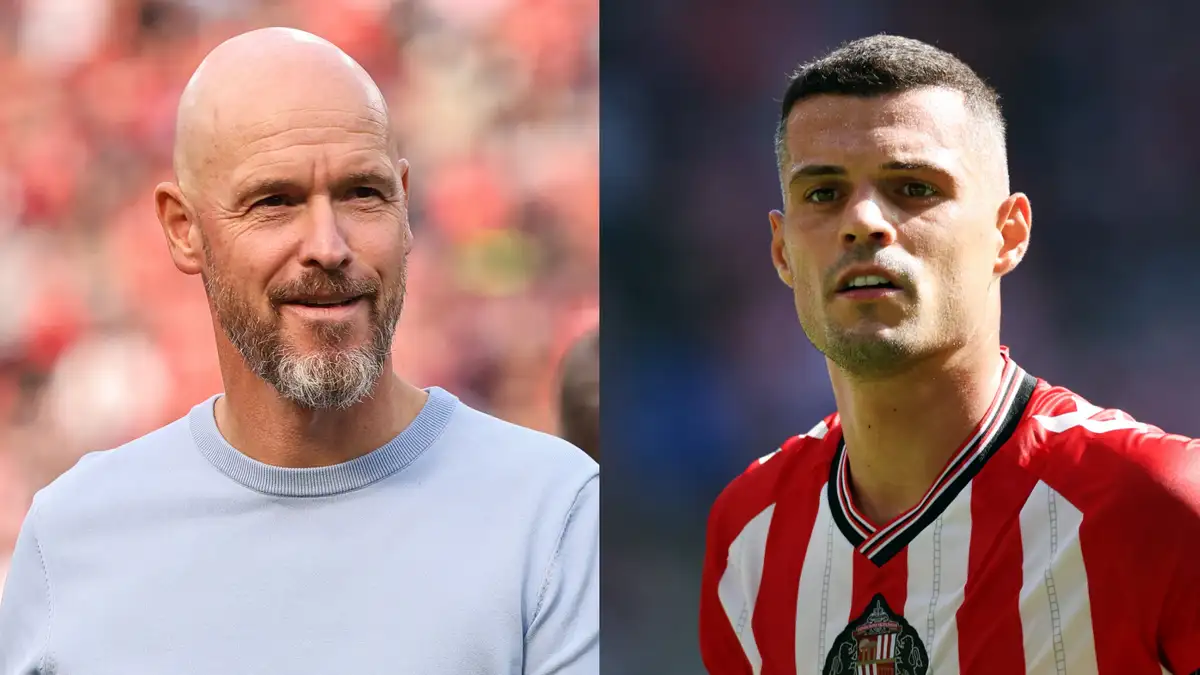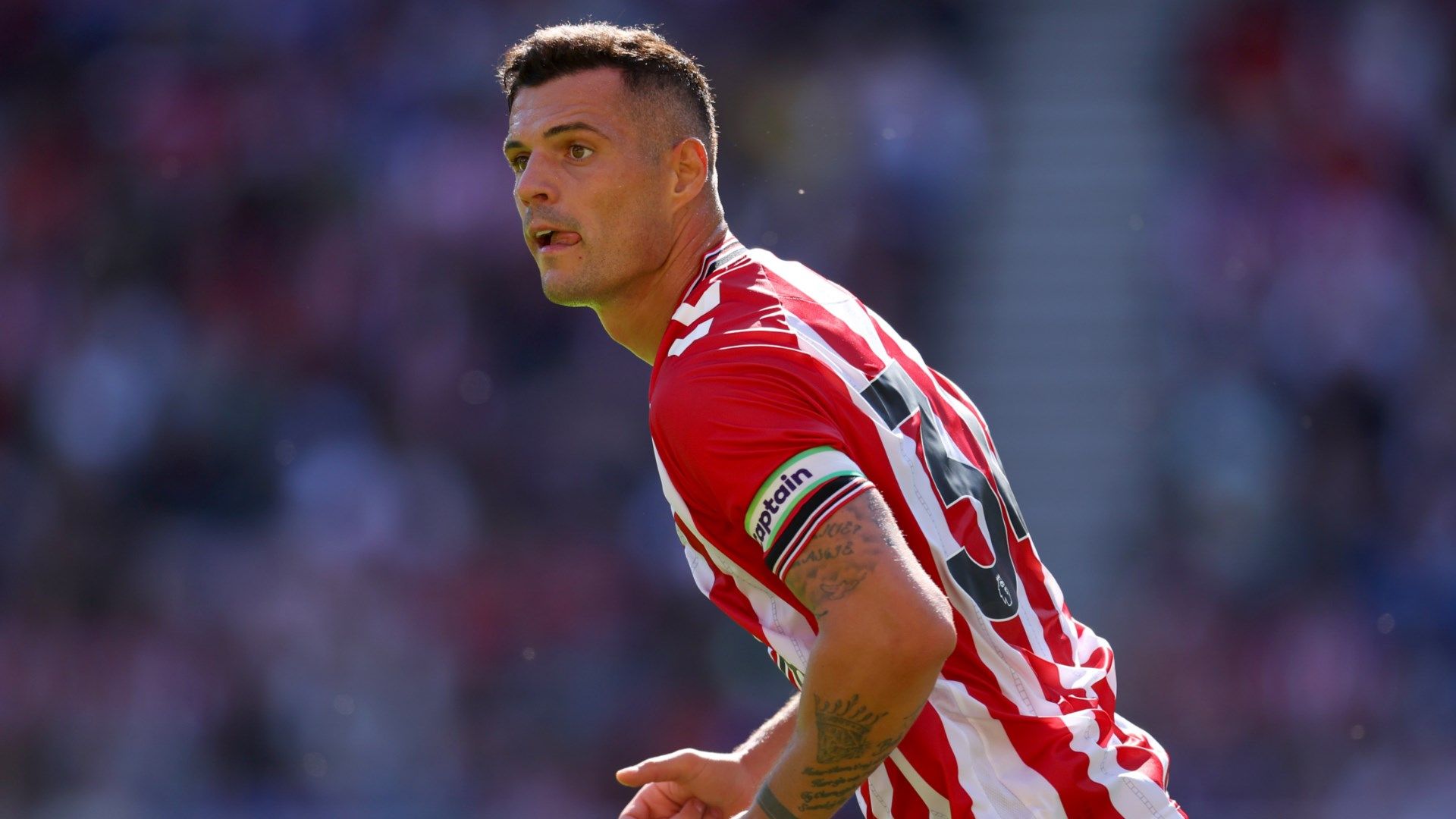
‘Erik ten Hag Was Never the Problem’ – Granit Xhaka Jumps to Bayer Leverkusen Coach’s Defence and Explains How Ambition to Become a Manager Motivated Sunderland Transfer
A Summer Full of Twists
The football world has seen its fair share of surprise transfers, but Granit Xhaka’s move to Sunderland may just be one of the most fascinating stories of the 2025 window. Having just lifted the Bundesliga title with Bayer Leverkusen, and being one of the leaders in Xabi Alonso’s historic treble-winning side, few expected the Swiss midfielder to leave Germany for a club that has only just returned to the Premier League.
Yet, in true Xhaka fashion, the 32-year-old midfielder has taken the road less travelled. And in doing so, he’s not only defended his new former manager, Erik ten Hag, from criticism but also explained why Sunderland felt like the right choice for the next chapter of his footballing life — one that ties directly into his dream of becoming a manager in the future.
Erik Ten Hag Was Never the Problem
As soon as Xhaka’s departure became official, speculation arose. Many pundits and fans quickly assumed that his exit had something to do with Ten Hag’s arrival at Bayer Leverkusen. The Dutchman, fresh from a turbulent spell at Manchester United, was brought in to replace Xabi Alonso, and the narrative suggested that perhaps the two strong personalities — Ten Hag and Xhaka — had clashed.
But speaking candidly to Bild, Xhaka quickly dismissed those claims.
“It annoys me that Erik is being portrayed as the problem. He was never the problem, never!” he stressed. “He only called me after three or four weeks because he didn’t want to disturb me during the holidays. I had a very good conversation with him. He knew I was looking at an exciting offer. And maybe he sensed he would lose me. But our conversation was always clear and correct. I would have played as captain under him.”
It was a rare, honest glimpse into the world of player-coach dynamics. Xhaka’s words underline that sometimes, football decisions aren’t about clashing egos or tactical disagreements — they’re about life choices, personal ambitions, and the pull of new challenges.,
.jpeg?auto=webp&format=pjpg&width=3840&quality=60)
Granit Xhaka Sunderland 2025
Sunderland’s Unexpected Call
If Ten Hag wasn’t the reason for Xhaka’s departure, then what was? Enter Kyril Louis-Dreyfus, Sunderland’s ambitious young owner, whose late-night phone call would ultimately change the course of the summer.
Xhaka recounted the moment with a smile:
“At 11 p.m., a Swiss number lit up on my phone. I was on my way to bed, the children were already asleep. And I hear: ‘Hello, this is Kyril. I’m the owner of Sunderland.’ I played along because I thought someone was playing a trick on me.”
But this was no prank. Within minutes, Louis-Dreyfus followed up with a FaceTime call alongside Sunderland’s sporting director and Xhaka’s agent. Suddenly, what seemed like an improbable scenario turned into a serious opportunity.
Ambition Beyond Playing
What convinced Xhaka to swap Champions League football for a rebuilding project in the North East? His answer is refreshingly human: the ambition to become a coach.
“I want to pursue a career as a coach at some point,” he explained. “That’s why it’s important to experience moments of suffering and solidarity. We will have to suffer a lot in the coming months. That’s another side of football, but it’s also part of it and will shape me.”
For Xhaka, the Sunderland story resonated deeply. The club’s struggles, its fight to reclaim its place in English football, reminded him of his own family’s beginnings. That sense of resilience, of starting from scratch, felt like a narrative he wanted to be part of — not just as a player, but as someone preparing for life after retirement.

burnley sunderland
Sunderland’s Determination
Another key factor was Sunderland’s sheer determination to land him. “They did everything, absolutely everything, to bring me back to England,” Xhaka admitted. “When a club gives you such feelings, it would almost be rude not to consider them. I was so touched by those in charge. I couldn’t say no.”
It’s a testament to Sunderland’s ambition under Louis-Dreyfus. For years, the Black Cats have been seen as a sleeping giant, weighed down by mismanagement and constant yo-yoing between divisions. But signing someone of Xhaka’s pedigree sends a clear message: Sunderland are not just in the Premier League to survive; they’re here to grow, to compete, and to re-establish themselves as a respected name.
The Bigger Picture
Xhaka’s move highlights a broader theme in modern football: the idea that not every transfer is about chasing trophies or money. Sometimes, it’s about personal growth, about finding meaning in a project.
At Leverkusen, Xhaka was already a champion. He had a settled role, a supportive fanbase, and the guarantee of European nights. By contrast, Sunderland offered uncertainty, struggle, and the possibility of setbacks. Yet, it was precisely those challenges that attracted him.
In many ways, it mirrors his playing style: fearless, uncompromising, always willing to confront the difficult path rather than take the easy one.
What Next for Xhaka and Sunderland?
The early signs are promising. Sunderland opened their Premier League campaign with a win against West Ham United, with Xhaka wearing the captain’s armband. His leadership was evident, both in his vocal presence on the pitch and in the way he marshalled a young squad that looked up to him.
Next up are fixtures against Burnley and Huddersfield, which will test the team’s ability to maintain momentum. For Xhaka, these games are about setting the tone — not just in terms of results, but in shaping the culture and mentality of a side that’s still finding its feet in the top flight.
If Sunderland can avoid a relegation battle and finish mid-table, it would be considered a success. But with Xhaka leading the charge, fans are daring to dream of something bigger.
Did You Know?
-
Granit Xhaka has now captained three different clubs in his career: Borussia Mönchengladbach, Arsenal, and Sunderland.
-
His move to Sunderland makes him one of the highest-profile signings in the club’s recent history, alongside the likes of Jermain Defoe and Steven Fletcher.
-
Despite his sometimes fiery reputation, Xhaka has worn the armband for both club and country — Switzerland — showcasing the respect he commands among teammates.
-
Sunderland’s last major trophy was the FA Cup in 1973; Xhaka’s arrival is seen by some fans as the beginning of a new ambitious era.
Conclusion: A Story of Football’s Human Side
In a football landscape often dominated by financial headlines and transfer gossip, Granit Xhaka’s move to Sunderland stands out for its sincerity. Here is a player who chose not the most glamorous path, but the one that spoke to his values, his ambitions, and his future beyond the pitch.
By defending Erik ten Hag, he’s reminded fans that not every exit is the result of conflict. And by embracing Sunderland, he’s shown that sometimes the most meaningful decisions are those that come from the heart.
For Sunderland supporters, the excitement is tangible. For Xhaka, the challenge is real. And for football as a whole, this story is a refreshing reminder that behind the contracts and the headlines, the game is still about passion, resilience, and the courage to embrace the unknown.
































There are no comments yet. Be the first to comment!